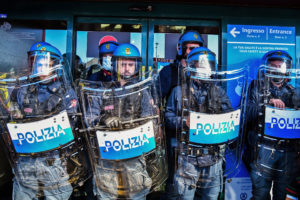Italy’s first-ever summer election does not take place for another month, but the outcome already appears certain: the country’s centre-Right coalition — comprising Giorgia Meloni’s Brothers of Italy, Matteo Salvini’s Lega and Silvio Berlusconi’s Forza Italia — is leading the polls by a wide margin. Victory seems guaranteed.
Brothers of Italy, in particular, continues its surge ahead of all the other parties, establishing Meloni as the de facto leader of the centre-Right coalition and as a likely candidate to become the first female prime minister in Italian history. Her party is now polling at around 25%, with Salvini’s Lega at 15% and Forza Italia at 7% — close to potentially giving the coalition more than 60% of the seats due to the current electoral system.
On the opposite front, the centrist Democratic Party (PD), the party of the establishment, has severed all ties with Giuseppe Conte’s Five Star Movement, which they hold responsible for the fall of the Draghi government — an unforgivable sin in the eyes of the Italian elites. However, by foregoing an electoral alliance with Conte’s party, which until a few months ago seemed all but certain, the PD has effectively given up its only chance of coming anywhere close to a majority. On its own, the PD is currently polling at 23%, making it the second party in the country. But with its centre-Left coalition made up of small parties, they are unlikely to gain more than 30% of the votes.
For its part, the Five Star Movement has experienced the most spectacular fall from grace of any party in modern European history: at the last elections, in 2018, on the back of a strongly anti-establishment rhetoric, it gained an astonishing 32.7% of the votes, 11 million in total, making it by far the most-voted party in parliament. Today it is polling at around 10%.
This is the result of what many view as a betrayal of the party’s ideals. Failing to achieve much during its short-lived “populist” government alliance with the Lega, it subsequently underwent nothing less than a full-blown transformation, first allying itself with the pro-establishment PD and then offering its unwavering support for the technocratic government of Mario Draghi, the embodiment itself of post-democratic technocratic management. Needless to say, voters weren’t impressed — hence the party’s free-fall in the polls.
Indeed, for the many millions of Italians who placed their hopes in Five Star, the lesson is a bleak one: voting is pointless. Unsurprisingly, most polls forecast the turnout at the upcoming elections to be the lowest ever — with potentially more than 40% of voters not bothering to head to the polls.
However, it would be a mistake to blame this on the Five Star’s betrayal — or on Matteo Salvini’s equally pathetic downfall from populist rabble-rouser to establishment apparatchik for that matter. These are epiphenomena of a much deeper, structural malaise of Italian post-democracy: the fact that governments, regardless of who gets elected, have little choice but to go along with what Brussels and Frankfurt say.
This became apparent during the Five Star Movement-Lega government. First, President Mattarella vetoed the economic minister proposed by two parties due to his euro-critical stance, forcing them to opt for a more status quo-friendly choice; then the executive found itself on a collision course with Brussels over a minuscule budget deficit increase, which eventually compelled the government to back down. Or one could go back to the even more dramatic events that led to Berlusconi’s resignation in 2011, when the European Central Bank, led by Draghi, engineered a sovereign debt crisis in order to force Silvio Berlusconi to leave office in favour of technocrat Mario Monti.
To put it starkly, Italy is no longer a democracy — it’s an appendage to the EU empire. There’s really no other way of describing a system where democratically unaccountable institutions, such as the European Commission and ECB, are able to arbitrarily decide the policies of elected governments or even forcibly remove them from office. So citizens can hardly be blamed for thinking that voting is, ultimately, pointless.
Parties are perfectly aware of this, but are unwilling to admit it to voters. And no one is more aware of it than Giorgia Meloni. She knows very well that Italy is not a sovereign nation, and that winning an election is only part of the effort. Having the support of the European (and American) establishment is just as important, if she wants to remain in power.
This is why she has gone to great lengths in recent months to dispel concerns about the party’s neo-fascist roots, and to express her wholehearted support for the European Union, the Euro-Atlantic partnership and Nato, including voting for sending weapons to Ukraine. Indeed, the first two points of the centre-right coalition’s agenda are the “full adherence to the European integration process” and “respect for Italy’s international alliances”.
By the same token, for all her talk of “being on the side of workers”, Meloni has made sure to steer clear of any socio-economic proposals that might come up against the EU’s economic governance, knowing full well that it would result in swift and merciless retaliation by the European authorities. Indeed, her economic agenda is a classic neoliberal-conservative agenda programme — based on lower taxes (but fiscal rectitude), workfare schemes (making income support conditional on accepting whatever job recipients are offered), and greater labour flexibility. The only proposal that defies the economic orthodoxy is the call for slightly higher pensions.
Overall, Meloni prefers to talk of cultural-identitarian issues rather than economic ones. Hence her agenda’s focus on defending and promoting “Europe’s classical and Judeo-Christian historical and cultural roots and identity”, tighter immigration rules and greater crime-prevention measures. This is partly a result of Meloni’s background, of course. But it’s just as much a consequence of the way in which the EU’s economic pensée unique, by ruling out all alternatives to managing society and the economy, inevitably ends up pushing political challenges to the status quo, and to the EU itself, on to a strictly cultural and identitarian terrain.
This explains why, across Europe, opposition to the EU isn’t couched so much in terms of the bloc’s economic policies but of its encroachment upon the “diversity” of the European peoples. This puts Meloni’s Brothers of Italy up there with all major European Right-wing parties — Viktor Orbán’s Fidesz, Poland’s governing Law and Justice or Austria’s Freedom Party — none of which openly challenge the EU’s economic architecture, but mostly focus their criticism on the bloc’s threat to European cultural and religious traditions. This is not to say that these issues are not important, but this trend is revealing of the way the EU has succeeded in shifting any opposition to itself from the socioeconomic terrain to the identitarian terrain, thus fuelling the very culture wars that are tearing our societies apart.
What we might expect from a future centre-Right government was recently spelled out by Lucio Baccaro: “They will pass a few (heinous) laws about migrants, LGBTs, etc., they will get a bit of pork for their constituencies, but otherwise the country will continue being governed from outside.” Meanwhile, amid a dramatically worsening social and economic crisis, the concrete material needs of most Italians will go unanswered. Meloni — just like all the other parties — has no clue about how to solve the energy crisis, for example, and indeed has vowed to continue sanctions against Russia and military support for Ukraine, which of course are at the root of the current crisis.
So why does Meloni enjoy such widespread and growing support? The answer is pretty straightforward: despite all the above, Brothers of Italy is the only party that has opposed the pro-EU and technocratic governments of the past ten years. And, therefore, in the eyes of a good number of Italians, Meloni still represents a challenge to the political establishment, which most Italians continue to rage against. For this very reason, Meloni channels the revulsion a lot of voters have for the PD, the incarnation of the progressive, pro-establishment, pro-EU Left.
This is also why the calls by the PD’s leader, Enrico Letta, to “unite against the fascist threat”, usually rather effective on Italy’s traditionally moderate electorate, are largely falling on deaf ears this time round. Not because Italians are developing a taste for fascism — there’s nothing “fascist” about Meloni by any reasonable understanding of the term — but because the anti-fascist trope rings increasingly hollow coming from a party that more than any other has supported the demolition of Italy’s democracy and welfare state at the hands of the European Union.
Even a growing number of people on the Left are coming round to this. A telling example was a rather astonishing article that appeared in the liberal-progressive magazine Left, which came to the following conclusion: “We need to face the reality that the Democratic Party is a deeply anti-popular, reactionary party, and is the main culprit of the Italian decline over the course of the past 15 years. Voting for it is not the least-worst choice, but the worst one.”
And yet, at the same time, those who vote for Meloni in the hope of changing things are likely to be disappointed. Given that the smaller anti-establishment parties — Gianluigi Paragone’s Italexit, the socialist anti-EU coalition Sovereign and Popular Italy, and the Left-wing Popular Union coalition — all risk remaining below the 3% threshold, the real threat to what’s left of Italian democracy doesn’t come from Meloni. Rather, it comes from the fact that, in all likelihood, 100% of the seats in the next Parliament will belong to the EU — and the stagnant economic system that caused this mess in the first place.
Disclaimer
Some of the posts we share are controversial and we do not necessarily agree with them in the whole extend. Sometimes we agree with the content or part of it but we do not agree with the narration or language. Nevertheless we find them somehow interesting, valuable and/or informative or we share them, because we strongly believe in freedom of speech, free press and journalism. We strongly encourage you to have a critical approach to all the content, do your own research and analysis to build your own opinion.
We would be glad to have your feedback.
Source: UnHerd Read the original article here: https://unherd.com/




